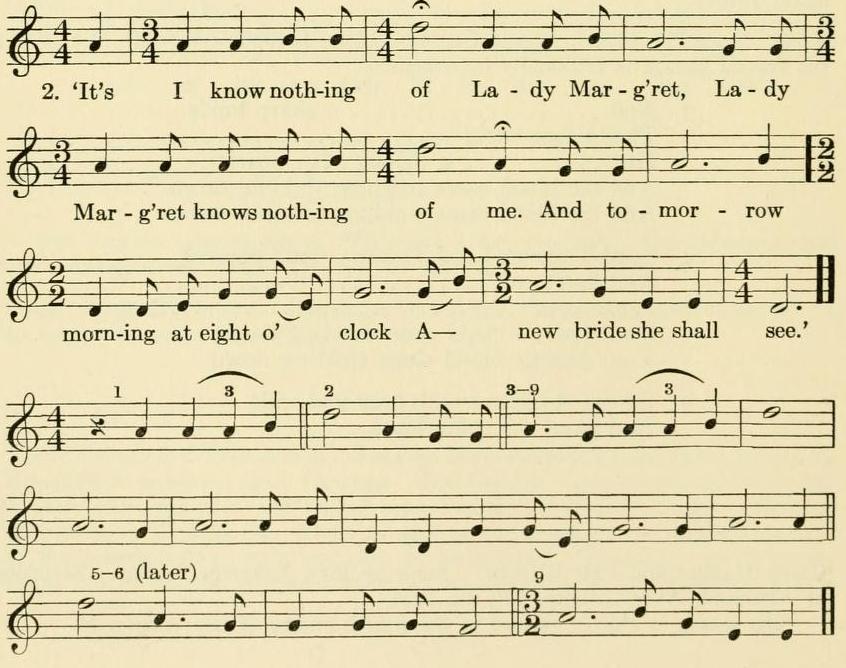Lady Marget- Fish (NC) pre1913 Brown/Perrow
[From The Brown Collection of North Carolina Folklore, Vol. 2, 1952. Music given to Version A, second stanza, by a different singer Nora Hicks is below. Hicks text is found in a separate version. Madison County ballad singers include Chanders and Wallins as well as younger generation singers.
R. Matteson Jr. 2014]
A. 'Lady Marget.' From the collection of Miss Edith R. Fish of White Rock. Madison county; one of the items she sent to C. Alphonso Smith in 1915 and which later came to the North Carolina collection with permission to publish. The meaning of "broughten" in stanzas 3 and 6 is not apparent. [This same version is published by Perrow "From North Carolina; mountain whites; MS. lent E. N. Caldwell; 1913."]
1 Sweet William arose one morning in May
And dressed himself in blue.
'Pray tell me all about that long, long love
Betwixt Lady Marget and you.'
2 'It's I know nothing of Lady Marget,
And she knows nothing of me.
Tomorrow morning at eight o'clock
Lady Marget my bride shall see.'
3 As she was a-standing in her dower room,
A-combing back her hair,
She saw sweet William and his brown broughten bride
As they drew near to her.
4 Back she threw her ivory comb
And back she threw her hair;
Then she ran to her bed-chamber
Nevermore to appear.
5 That very same night when they were all in the bed.
When they were all in the bed asleep.
Lady Marget rose, stood all alone
At sweet William's bed feet.
6 'And how do you like your bed, sweet William,
And how do you like your sheet.
Or how do you like your brown broughten bride
That lies in your arms asleep?'
7 'Very well, very well I like my bed,
Very well I like my sheet;
Ten thousand times better I like the lady gay
That stands at my bed feet.'
8 Sweet William arose, stood all alone,
And tingled at the ring.
There's none so ready but her seven brothers all
To rise and let him in.
9 'Oh, where is Lady Marget?' he says,
'Oh, where is Lady Marget?' he cries.
'Lady Marget is the girl I always did adore.
And she stole my heart away.
10 'Is she in her dower room?
Or is she in her hall?
Or is she in her bed-chamber
Among her merry maids all ?'
11 'She is not in her bower room,[1]
Nor neither in her hall,
But she is in her cold coffin.
Her pale face towards the wall.'
12 And down he pulled the milk-white sheets,
They were made of satin so fine.
'Ten thousand times you've kissed my lips,
And now, love, I'll kiss thine.'
13 Three times he kissed her snowy white breast,
Three times he kissed her cheeks;
But when he kissed her cold clay lips
His heart was broke within.
14 'What will you have at Lady Marget's burying?
Will you have bread and wine?
Tomorrow morning at eight o'clock
The same will be had at mine.'
15 They buried Lady Marget at the church door
And buried sweet William by her.
Out of Lady Marget 's grave sprung a green, green rose
And out of sweet William's a brier.
16 They grew and grew to the top of the church.
And they could grow no higher.
And they tied a true love's knot
And lived and died together.
1. This is "dower room" in stanzas 3 and lo, "bell room" in B, "dining room" in C, "dressing room" in G ; elsewhere "bower room" as here, which seems to be the right reading.
A. 'Lady Margaret.' Sung by Mrs. Nora Hicks. Recorded at Mast's Gap, Sugar Grove, Watauga county, August 28, 1940. The first stanza was not recorded.

For melodic relationship cf. **SCSM 390; *SharpK i 140, No. 20H, only, however, in its most basic melodic points. Scale: Mode III, plagal. Tonal Center: g. Structure aa1bc (3.3,2,2) = ab (S, 5) ; possibly also mm1n (3,3,4) = barform. Circular Tune (V).